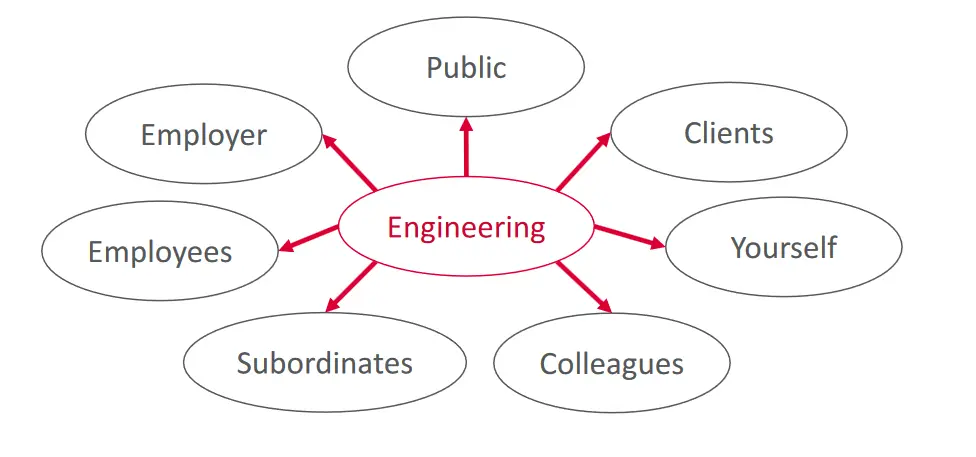Quiz 2 material for ENSC 100W
Professions
-
Professions have a significant impact on the public
- require professional judgment
- require formal education
- allowed to self-regulate
- has a beneficial effect on the public
-
Engineering has many responsibilityies=
 -
--
How to make decisions
-
simple ethical problems
-
Hard ethical problems
-
Provinces and the professions
-
IN canada, professions are regulated under the provincial governments
-
Provicial government
- Engineers granted exclusive rights of practise and title under the Engineers and Geoscientist act
-
EGBC
- required under act to establish, maintain and enforces standardrs
- Controls the term engineer
- P.Eng registrants can only be called engineer
-
P.Eng
- members must self-regulate profession in the public interest
EGBC Code of Ethics
-
Preamble
- act with fairness, courtesy and good faith
- uphold the values of truth, honesty and trustworthiness
- safeguard human life and welfare nad the environment
-
CODE OF ETHICS
-
1. act in the public interest
- hold paramount the safety, health, and welfare of the public, incrliding the protection of the environment
-
2. know your limits
- Undertake and accept responsibility for professional assignments only when qualified by training or experience
-
3. Follow the law
-
4. follow the standards of gov or EGBC
- have regard for standards, polices and plans
-
5. maintain your competence
- maintain your competence in relevent stuff
-
6. state qualifications accuratly
- strive to advance the body of knowlednge withinthe practice
-
7. distinguish facts from assupsions/opinions
- provide profession opinions that distnguish between facts
-
8. no conflicts of interest
- conflict of interest and ensure no conflicts including persived ones.
- properly discloes and take action no bias
-
9. Duty to report
- report to EGBC and other authorities
-
10. stand your ground
-
11. Each professional is responsible
- clearly identify each registrant who has contributed
-
12. work diligintly and fololow sntandards of documentation
- undertake work and documentation with diligence and accordance witha ny guidance developed to standardize professional documentation
-
13. Due onto others
- conduct themselves with fairness, courtesy and good faith
Negligence
-
Under tort law:
- a wrong committed by one person against another; not a crime; not a breach of contract
-
3 essentials elements of negligence
-
1. Defendant owed plaintiff a duty of care
-
2. defendant breached duty through action or inaction below the standard of care
-
3. defendants breach caused injury to plaintiff
Intellectual property
-
Copyright
-
Literary works
-
DRamatic works
-
musical works
-
Artistic works
-
Trademork
- disguishes brand from others
- protects both companies and consumers
- rights acquired throught use of tm or the little r
- cant be a name
- for particular ware or service
 -
-